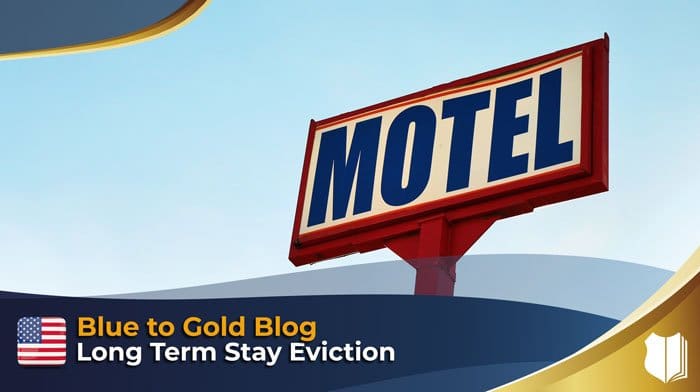LONG TERM STAY EVICTION
Hello again. This is Anthony Bandiero, attorney and senior legal instructor for Blue to Gold Law Enforcement Training, bringing a question from the great state of Idaho, which is going to be my future residence one day.
This question is, “Can police evict tenants or occupants from a long term stay motel?”
This is this area of the law that is really underdeveloped. We certainly have a lot of cases from evicting people from motels and hotels, and of course, we have lots of cases from trying to get people out of apartments and houses.
Then in between those two is the long term stay; the extended stay America type of situation. And let’s go through it. This is good stuff here.
So here’s the scenario. A local hotel, it was a Motel Six, and now it’s called the Extended Stay. Yeah, extended stay. I would love to live there. It just sounds like a beautiful place. So the cop gets requests by the staff to evict people.
Now, while we’re on the subject of evicting people, the questioner is also asking other questions:
“Do we have to?”
“Does the manager have to give the notice to evict?”
“Can we do it for the manager?”
“Can we walk right in through the door?”
“Can we use the master key and just walk right in?”
I’m telling you, this is going to help you because this issue comes up all the time. Okay, let’s first start with the premise of dealing with true hotels that are your stereotypical night-to-night type of scenarios. The law is pretty clear on this one. Hotels and motels have a common law right to evict people for cause. These are what the courts refer to as transient lodging.
The person knows that they’re not going to be staying there forever, and that if they break the rules, it’s not unreasonable to expect to get the boot. So the law is pretty clear. If the management calls you and says, “Hey, we need help,” then this person, because of partying, drugs, smoking, breaking stuff, whatever; the law’s pretty clear that they have to leave.
What about if they’ve paid for the next week? That’s a civil issue. The money that’s owed is a civil issue. That’s not your problem.
The next thing is, of course, apartments, houses and rented rooms. We know that those are homes. You cannot go in there and evict people from those tenancy relationships, whether it’s a verbal contract or written; it doesn’t matter because that is their home. The law has an interest in not putting people on the street from their home. Does that make sense?
So those are your two different situations, and we get to meet in the middle with the long term stay. So here’s my advice. If you’re dealing with an occupant of a hotel, or whatever it is, you may have to inquire about, “Is this their long term stay? What’s this guy’s deal? How long has he been here? Did he tell you when he’s leaving?”
If it seems to you that this long term stay is their home, that this is their plan to stay for a long time’ they’ve been there for a long time, they’ve paid for the room in advance for a while and you’ve been asked to evict them, you’re making case law, right? I can’t find any case law that’s really decided these issues yet.
If it was me and I believed that this person, the occupant, really believed that this was his new home, and he planned to stay there for a while, I’m going to tell the manager, “Get eviction orders.” That’s just what I would do. I’m not looking to make that case law.
But if I believe that this person is essentially the same type of person that stays at transient lodging like motels, they pay for one day or two days at a time and we’re unsure when they’re leaving, I’m going to treat them like a hotel guest. And therefore they’re subject to immediate eviction.
Does that help? I’m not trying to confuse this issue. But I think that you should inquire on these situations and see who they are. Are they tenants, or are they a mere transient occupant of a hotel? So that’s what I’m looking for.
Some states, like Illinois have a 30 day rule that really helps cops. If they’ve been there for more than 30 days, they definitely get treated like a tenant. So you have to get eviction orders.
If a person in Illinois hasn’t been there for thirty days, but they paid up for 30 days and intend to stay longer, does that mean that they cannot be evicted at two weeks? The answer is, “I don’t know.” If the court believes that they are tenants and have a reasonable expectation of long term stay, I think you’re going to still have the same problems I’m talking about.
Alright, let’s move on to who has to do the eviction. Does the manager have to be the one at the door? The answer is, “No.” Should they be the one to do it if it’s safe? The answer is, “Yes.”
The next question is, “Can we just barge right in?” The answer is, “No.” Knock and announce applies here. This is a Fourth Amendment issue. We can’t just barge in there and tell them, “Hey, you’re out of here!”
You want to do it professionally. Reasonably give them notice and tell them, “Hey, you guys are being evicted.”
What if they say, “I don’t want to answer the door.”
Then you say, “You don’t have a choice. You’re being evicted. Your occupancy ends now.” And then you go from there.
It’s a very good question. The big takeaway here is to use good judgment. If under the totality of the circumstances, the long term stay occupant seems to believe that this is more like an apartment than a hotel, I would get eviction orders. That’s what I would suggest to my cops.
Alright, I hope it helps you guys. I want to teach as many cops as possible search and seizure so we’re making good case law. Until next time my friends, stay safe.
Thank you for the question, and keep them coming!










